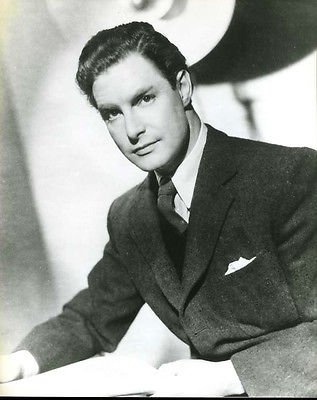 He was one of the biggest stars in British cinema, but only made 19 films. He was celebrated for his beautiful speaking voice, but suffered from crippling asthma. He made his name playing dashing heroes, but is now best remembered for his performance as a shy schoolteacher.
He was one of the biggest stars in British cinema, but only made 19 films. He was celebrated for his beautiful speaking voice, but suffered from crippling asthma. He made his name playing dashing heroes, but is now best remembered for his performance as a shy schoolteacher.
He might be the finest actor Britain ever half-forgot it had.
Robert Donat was born in Manchester in 1905. Tall, classically handsome, with a voice that could melt ice, he moved with a dancer’s grace, even when he was trying to be clumsy. He had large eyes and a face that was like a seismograph, attuned to even the slightest tremor of emotion. Like Leslie Howard, he also had an air of unflappable Englishness and responded to mortal peril with practicality and humour, if not always decorum. His ease onscreen belied his deep insecurities about his talent.
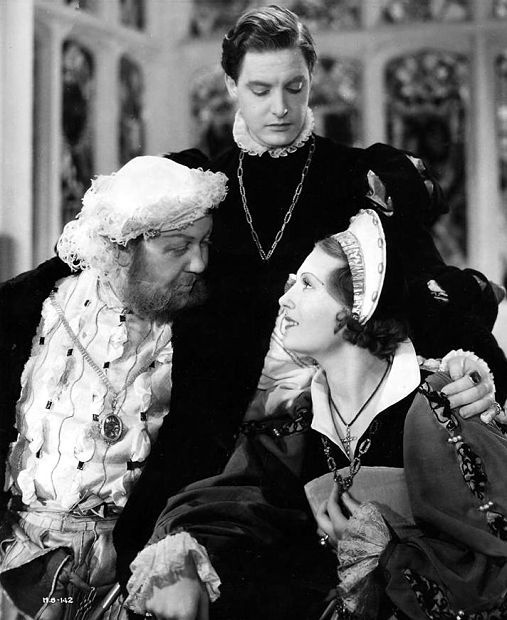 A stage actor from his mid-teens, Donat’s big break in films came with Alexander Korda’s The Private Life of Henry VIII (1933), in which he played Thomas Culpeper, Katherine Howard’s lover. The film really belongs to Charles Laughton, who practically chews up the screen as Henry, yet Donat still makes an impression as Howard’s ill-fated suitor. In a pivotal scene, Katherine sings for Henry at a banquet and Thomas watches her rapturously, trying to drink in every inch of her, until Henry asks him her name and he realizes with despair that the king has just chosen his next mistress. The film was British cinema’s first major hit in the United States (Laughton won the Oscar for best actor) and boosted the careers of all involved, including Donat. He was soon in Hollywood starring as a charismatic Edmond Dantes in The Count of Monte Cristo (1934), the first sound adaptation of Alexandre Dumas’ much-filmed novel. Yet despite the film’s success, Donat disliked Hollywood and never made another movie there. He turned down the title role in Captain Blood (inadvertently launching Errol Flynn’s career) and went back to Britain to make The 39 Steps (1935) instead. As Richard Hannay, an ordinary man who stumbles upon a deadly conspiracy, Donat is witty, cool and supremely self-possessed, the linchpin for one of Alfred Hitchcock’s best early thrillers. Two-thirds of the way in, the film takes an unexpected detour into buddy comedy when Hannay finds himself handcuffed to a young woman (Madeleine Carroll) who refuses to believe his story—Donat doesn’t skip a beat, alternately cajoling and threatening her with impeccable sangfroid.
A stage actor from his mid-teens, Donat’s big break in films came with Alexander Korda’s The Private Life of Henry VIII (1933), in which he played Thomas Culpeper, Katherine Howard’s lover. The film really belongs to Charles Laughton, who practically chews up the screen as Henry, yet Donat still makes an impression as Howard’s ill-fated suitor. In a pivotal scene, Katherine sings for Henry at a banquet and Thomas watches her rapturously, trying to drink in every inch of her, until Henry asks him her name and he realizes with despair that the king has just chosen his next mistress. The film was British cinema’s first major hit in the United States (Laughton won the Oscar for best actor) and boosted the careers of all involved, including Donat. He was soon in Hollywood starring as a charismatic Edmond Dantes in The Count of Monte Cristo (1934), the first sound adaptation of Alexandre Dumas’ much-filmed novel. Yet despite the film’s success, Donat disliked Hollywood and never made another movie there. He turned down the title role in Captain Blood (inadvertently launching Errol Flynn’s career) and went back to Britain to make The 39 Steps (1935) instead. As Richard Hannay, an ordinary man who stumbles upon a deadly conspiracy, Donat is witty, cool and supremely self-possessed, the linchpin for one of Alfred Hitchcock’s best early thrillers. Two-thirds of the way in, the film takes an unexpected detour into buddy comedy when Hannay finds himself handcuffed to a young woman (Madeleine Carroll) who refuses to believe his story—Donat doesn’t skip a beat, alternately cajoling and threatening her with impeccable sangfroid.
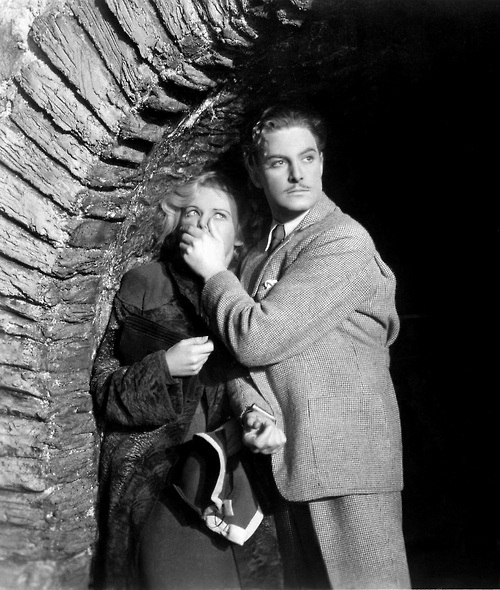 Donat had dash, but he also played well in other keys. He could be silly (the dual role of laird and ghost in The Ghost Goes West (1935)) or foppish (the deceptively shallow spy in The Adventures of Tartu (1943)) or achingly sincere. In King Vidor’s The Citadel (1938) he plays Andrew Manson, an idealistic young doctor in a Welsh mining village. When a baby is born stillborn to a couple that has longed for a child, he refuses to give up, rubbing the infant with a towel and gently blowing air back into his lungs until at last, the baby starts to cry. Donat is transcendent with joy. He walks home, still glowing, until the funeral being held next door for a typhoid victim he couldn’t save brings him crashing down. Later, Manson abandons his principles to become a fashionable London physician and audiences can tell at a glance what he’s lost: Donat substitutes jaded indolence for passion, revealing a degree of emotional shading that almost certainly wasn’t in the script.
Donat had dash, but he also played well in other keys. He could be silly (the dual role of laird and ghost in The Ghost Goes West (1935)) or foppish (the deceptively shallow spy in The Adventures of Tartu (1943)) or achingly sincere. In King Vidor’s The Citadel (1938) he plays Andrew Manson, an idealistic young doctor in a Welsh mining village. When a baby is born stillborn to a couple that has longed for a child, he refuses to give up, rubbing the infant with a towel and gently blowing air back into his lungs until at last, the baby starts to cry. Donat is transcendent with joy. He walks home, still glowing, until the funeral being held next door for a typhoid victim he couldn’t save brings him crashing down. Later, Manson abandons his principles to become a fashionable London physician and audiences can tell at a glance what he’s lost: Donat substitutes jaded indolence for passion, revealing a degree of emotional shading that almost certainly wasn’t in the script.
His gift for nuance was his greatest asset and the hallmark of two of his best performances.
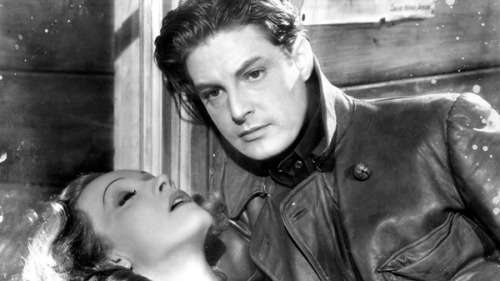 In Knight Without Armour (1937), he plays A.J. Fothergill, alias Peter Ouranoff, a British spy caught up in the Russian Revolution. Pretending to be a Communist, he is tasked with escorting Countess Alexandra Vladinoff (a radiant Marlene Dietrich) to Petrograd, but falls in love with her instead. Donat is magnetic as Ouranoff, sharing a palpable chemistry with Dietrich. In my favourite scene, Ouranoff and Alexandra are waiting in a deserted station for a train that may never arrive. Alexandra can’t sleep. Ouranoff tells her reciting poetry got him through long nights in Siberia, so she asks to hear some Browning. Donat recites ‘Prospice’ in his mellifluous voice, his eyes lighting up in something close to rapture:
In Knight Without Armour (1937), he plays A.J. Fothergill, alias Peter Ouranoff, a British spy caught up in the Russian Revolution. Pretending to be a Communist, he is tasked with escorting Countess Alexandra Vladinoff (a radiant Marlene Dietrich) to Petrograd, but falls in love with her instead. Donat is magnetic as Ouranoff, sharing a palpable chemistry with Dietrich. In my favourite scene, Ouranoff and Alexandra are waiting in a deserted station for a train that may never arrive. Alexandra can’t sleep. Ouranoff tells her reciting poetry got him through long nights in Siberia, so she asks to hear some Browning. Donat recites ‘Prospice’ in his mellifluous voice, his eyes lighting up in something close to rapture:
For sudden the worst turns the best to the brave,
The black minute’s at end,
And the elements’ rage, the fiend-voices that rave,
Shall dwindle, shall blend,
Shall change, shall become first a peace out of pain,
Then a light, then thy breast,
O thou soul of my soul! I shall clasp thee again,
And with God be the rest.
As he loses himself in the words, you see the passionate romantic that hides behind his nonchalant facade and realize that for all his modern trappings, he really is a knight of old, willing to risk everything for those he loves. It’s a moment of sublime beauty which suffuses every love scene that follows.
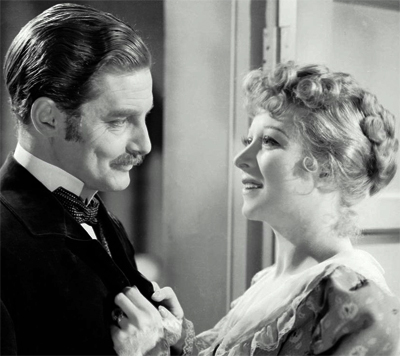 In his best-known role, as Charles Chipping in Goodbye, Mr Chips (1939), Donat is a shy schoolmaster who struggles to connect with his pupils, until love warms his heart. It’s a story that could have drowned in its own sentimentality. But Donat makes it one of the most affecting transformations ever filmed. Chips’ stuffy exterior masks a tender heart, yet all his students, and indeed most of his colleagues, think he’s a bore. After years of loyal service, Chips is sure he’s about to receive his long-awaited promotion to housemaster. Instead he’s told that the job is going to someone else. The small, hopeful light in Donat’s eyes fades, the corners of his mouth droop and he tilts his head forward in abject resignation—his dearest hopes have collapsed, but so quietly that only we notice. Soon after, Chips meets Kathy (Greer Garson, in her film debut). She is vivacious, talkative and good with people—his complete opposite. He falls in love, and blooms. Donat shows Chips coming out of his shell slowly, timidly, astonished that such a dazzling woman would notice him, let alone love him in return. Simply working up the courage to propose to her is a triumph. Donat won the Best Actor Oscar against stiff competition including Clark Gable in Gone with the Wind and James Stewart in Mr. Smith Goes to Washington, and it’s not hard to see why.
In his best-known role, as Charles Chipping in Goodbye, Mr Chips (1939), Donat is a shy schoolmaster who struggles to connect with his pupils, until love warms his heart. It’s a story that could have drowned in its own sentimentality. But Donat makes it one of the most affecting transformations ever filmed. Chips’ stuffy exterior masks a tender heart, yet all his students, and indeed most of his colleagues, think he’s a bore. After years of loyal service, Chips is sure he’s about to receive his long-awaited promotion to housemaster. Instead he’s told that the job is going to someone else. The small, hopeful light in Donat’s eyes fades, the corners of his mouth droop and he tilts his head forward in abject resignation—his dearest hopes have collapsed, but so quietly that only we notice. Soon after, Chips meets Kathy (Greer Garson, in her film debut). She is vivacious, talkative and good with people—his complete opposite. He falls in love, and blooms. Donat shows Chips coming out of his shell slowly, timidly, astonished that such a dazzling woman would notice him, let alone love him in return. Simply working up the courage to propose to her is a triumph. Donat won the Best Actor Oscar against stiff competition including Clark Gable in Gone with the Wind and James Stewart in Mr. Smith Goes to Washington, and it’s not hard to see why.
As he grew older, Donat’s asthma worsened, curtailing his career. His final appearance was as the wry Mandarin who grows to respect Ingrid Bergman’s missionary in The Inn of the Sixth Happiness. He died shortly after filming his scenes. His last words onscreen, spoken to Bergman, were: “We shall not see each other again, I think. Farewell.”
Leave a Reply